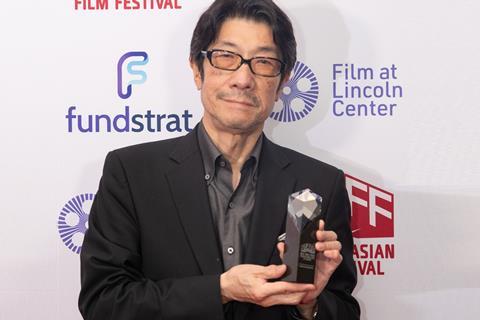
Veteran Japanese director Junji Sakamoto makes films to cheer himself up.
“I’m making films for myself,” said the auteur on the eve of receiving the Screen International Star Asia Lifetime Achievement Award at the New York Asian Film Festival (NYAFF).
The acclaimed writer and director has primarily worked outside the country’s studio system since his debut nearly 35 years ago. He has taken on a variety of genres and tackled controversial topics across his career with titles such as crime drama Face, which played in competition at San Sebastian in 2000 and won best director at the Japanese Academy awards; kidnap thriller KT, which played in competition at the Berlinale in 2002; and more recently eco-fable Okiku And The World, which premiered at Rotterdam and screened at this year’s NYAFF.
Sakamoto spoke to Screen about reactions to his latest film, how he seen the business change over more than three decades and how he may focus on the older generation for his next film.
What does it mean to receive this award in New York?
It has been 35 years since I became a director and I’ve been to so many festivals but this is my first time receiving an award for me. This award is about my whole career, not only this movie, so I feel reassured and happy that what I’ve done has been accepted as something positive. It is even more meaningful because I’m the kind of person that – when I make a film – just thinks about the Japanese audience. I’m not trying to make a film for overseas markets. The fact it is being appreciated makes it even more meaningful.
Why have audiences responded so well to Okiku And The World, a tale of “manure men” who collect sewage in Japan?
I think this film is quite unique in depicting the bio circular economy and it covers something people don’t usually like to talk about – human faeces. However, it also expresses the beautiful young days of people and romance.
It is also very beautiful to watch.
I’m so happy that you think it’s beautiful as people come to me and say that it was stinky and dirty.
Do you see different reactions in different countries?
The Japanese audience tend to be quieter. However, in Rotterdam and Korea I could hear their reactions, and in New York City I could definitely hear more laughter.
How have you seen the business change since you began directing 35 years ago?
In Japan, there used to be low budget movies, major films and a middle ground. This middle ground had commercial films but also artistic elements. However, these days it’s just extremely low budget, independent films and major big-budget films. It’s just extreme cases these days.
How challenging is it to get an independent film funded these days?
Most of the major film companies now make decisions at board meetings. They focus on manga adaptations, novels or celebrity actors. They don’t want to take any risks. So more unique stories go to independent productions. However, the definition of an independent production now is different to how it used to be. This is why people need to rely on crowdfunding and stick to low budget.
You appear to operate outside of the studios. Do you feel like an outsider?
I have worked on major productions before. However, I want to keep challenging myself in the sense that I could be an outsider, fighting against big business. My dear, senior filmmakers told me that filmmakers have to make films with ethics, morals and justice. If you stick to these principals, the path emerges naturally.
What is the next challenge?
I just made a film about young people so maybe my next movie is about the people of my generation or older. When I make films, I think about which generation I’m going to be targeting this time, even before I think about the theme of the movie.
Are there any directors who you see as being the next Sakamoto?
I recently saw a film, JJ005311, by two young actors who did everything. Just one actor and one director. It was beyond the norm. I could feel they purely wanted to make a film. I am the same. I’m trying to cheer myself up. I’m making films for myself.






![The Brightest SunScreen[Courtesy HKIFF]](https://d1nslcd7m2225b.cloudfront.net/Pictures/274x183/3/5/0/1448350_thebrightestsunscreencourtesyhkiff_312678.jpg)


















No comments yet